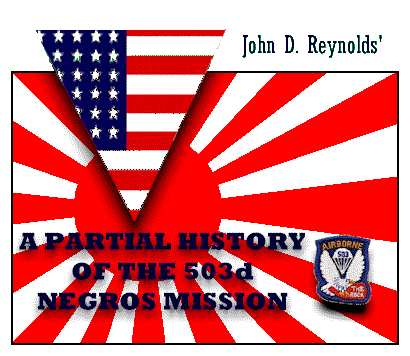|

Several years after I had returned home, I found myself
with an ex 503rd paratrooper who lived in my small hometown, and we were
discussing the 503rd PRCT mission on the island of Negros, one of the Visayan
group, in the central Philippine Islands. He
had served in Headquarters Company of the 3rd Bn. in an 81mm mortar platoon.
He stated that he had never fired an 81 mm mortar during the Negros
campaign. This seemed especially
strange to me because I could recall a number of times when my squad could have
desperately used such mortar support, albeit from another battalion. During the
course of our conversation he remarked in all seriousness,
"There
wasn't much fighting on Negros!"
I almost could not believe I was hearing the words coming
out of his mouth, for the Negros Campaign was not only extensive, it was also
multi-phased and complex, and it evoked ambiguous and sometimes vastly
conflicting memories as to what occurred.
Having joined the 503rd on Mindoro while the regiment was still on Corregidor, I
can not personally compare the Negros mission to any of the others in which the
503rd had participated. However, I
have talked to many troopers and have read statements made by others who were in
a position to judge – and they generally proclaim that Negros was the toughest
mission of them all.
Statements
of this nature are personal judgments and may or may not be true, but some
things are true and unlikely to result in any argument – notably, the Negros
mission has received inadequate recognition, and the people who were there have
only a limited amount of knowledge as to what happened.
There are a number of reasons for this, and they include the following:
(a)
The three infantry battalions of
the 503d PRCT fought in combination as a regiment for a total of 17 days only of
the 130 day mission. The changing
relationships between the Negros forces thus defies most attempts by the people
who fought there from knowing the details of the overall operation;
(b)
There is no great historical
significance associated with the Negros mission;
(c)
The invasion of Negros happened
the same time as the invasion of Okinawa, and, thus heavy fighting of a
headline-grabbing nature was going on hundreds of miles to the North;
(d)
Separate battalion operations
were conducted in different parts of the island, in differing terrains and to
different purposes. The type of fighting which took place on Negros over an
extended period of time was of various differing types, making a single
classification of the nature of the mission almost impossible;
(e)
There were no company level
pre-mission critiques nor were there any attempts to update information to the
troops during the mission. The
individual troopers thus had almost no knowledge concerning Negros.
The
information presented here has been extracted from material and opinions
compiled by the author, and by 1st Lt. Bill Calhoun of “F” Company, from
excerpts from “D”, “E”, and “F” Company daily histories, and from
information from the 503rd PRCT Historical Report (Operations).
1st Lt. John Lindgren of D Company has supplied the map.
The text reflects my own personal recollections and opinions. This article is not intended to be an exclusively 2nd
Battalion oriented history, but at the time of writing, the limited information
available to me might make it appear so. Any
future information from the 1st and 3rd Bn. company histories would be most
welcome and could be incorporated into an expanded version of the Negros
mission.
John
D. Reynolds
CHRONOLOGY
OF EVENTS | PHASE I |
PHASE
II | PHASE III | PHASE IV

|

